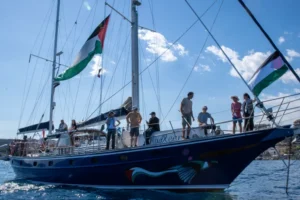Why the Freedom Flotilla matters to us in Gaza

The crew of the Gaza-bound Madleen ship before leaving the port of Catania, southern Italy on 1 June 2025
Malak Hijazi writes in Mondoweiss on 19 June 2025:
I was born in Gaza just a year before the Second Intifada. I do not remember a single year of my life passing in a normal rhythm. I remember squeezing into street corners to dodge stray bullets. I remember sitting at my school desk, waiting to hear the bomb fall, because hearing it meant I was not the target.
In 2007, when I was eight years old, Israel imposed a harsh siege on Gaza. I remember times when we had nothing to eat except two cans of tuna. I would go to the nearby supermarket hoping to buy some snacks, only to find the shelves empty. Life was immense in its harshness, and we lived and still live in the world’s largest open-air prison. That is all I remember.
The only place that gave us a fleeting sense of freedom was the sea. We often call it the Gaza Sea, even though it is part of the Mediterranean. Somehow, it always felt disconnected from its other parts, as if it had turned into a vast lake trapped within Israeli-made borders. It became difficult to imagine that we were close to Jaffa, or Alexandria, or Athens. Israel had successfully isolated us from the world, and eventually, we began to believe it was unreachable.
In May 2011, I was eleven. I remember watching the Mavi Marmara on TV, believing it would reach us. I pictured it coming closer, flags waving, people cheering, the ship drawing a line across the sea. I didn’t understand the politics, but I understood what it meant to hope. When it was attacked and its passengers were killed, something inside me collapsed. Even the sea had turned its back on us. It had been shut like a door. That moment reshaped how I understood space, freedom, and the future. Help had come, but was stopped before it could arrive.
Now, in 2025, there is another ship. Its name is Madleen, after a Palestinian fisherwoman from Gaza whose boat was seized by Israeli forces.
